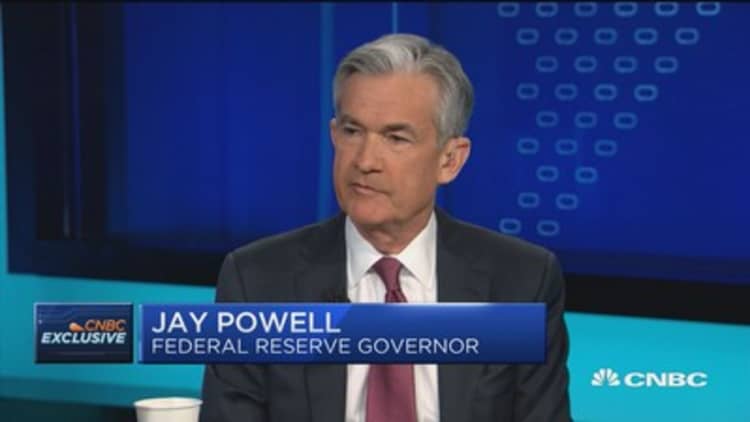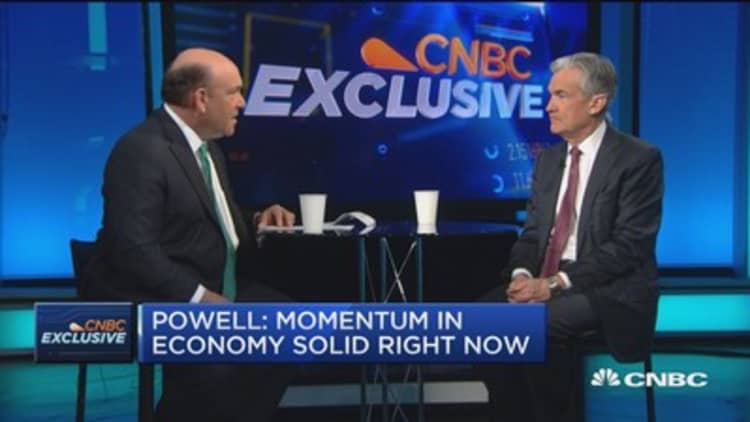
After raising interest rates just twice in 10 years, the Federal Reserve is suddenly in a hurry to get moving on its next rate hike.
In what looks to be an early spring migration, Fed officials have turned very hawkish overnight, warning a rate hike is likely in mid-March, while Wall Street had been expecting a June hike. Fed Chair Janet Yellen is likely to send that message when she speaks Friday at 1 p.m. ET at the Executives' Club of Chicago, and similar comments are expected from Fed Vice Chair Stanley Fischer at noon.
"Speaker after speaker, whether they lie on the dovish or hawkish end of the spectrum, have all shifted to the right," said Rob Martin, senior U.S. economist at Barclays.
Martin said the three most important Fed officials to comment this week were New York Fed President William Dudley, Fed Gov. Lael Brainard, usually very dovish, and Fed Gov. Jerome Powell. "When the regional presidents go out and talk, they're not as coordinated. When we see two people come out from the board and give a similar message, that feels like a coordinated communication, and I expect the chair to echo those sentiments when she speaks," said Martin. Brainard and Dudley are viewed as part of the dovish core of the Fed, along with Yellen and Fischer.
So, strategists and economists have come up with reasons they believe the Fed could feel compelled to get off the sidelines and begin delivering the three rate hikes it has forecast for this year.
The first reason, suggested by David Ader, chief macro strategist at Informa
Financial Intelligence, is part of what he says could be the Fed's hidden agenda.
Right about when the Fed would vote on a rate hike March 15, the legislated extension of the debt ceiling expires, putting Congress on notice it needs to come to a budget solution to avoid default. The government would run out of money sometime in the fall, and that's when the budget battling could really heat up in Washington. While it's widely expected the administration and Congress will work out a deal, Ader said there is also going to be a lot of discussion about other budget-related topics, such as tax reform, fiscal stimulus and how to pay for it all.
"I think there's a secret agenda. If we're talking about it, they're talking about it," he said. "We could have a debt ceiling fight. … The debate and contentiousness within the Republican party, it could be severe. The Fed obviously wants to hike. It's been trying to hike."
Ader changed his mind this week, and now thinks a March hike is mostly certain. "I do not think this is the main thrust of it. I think the Fed wants to hike on its own merits, but nonetheless the timing has worked out that if it's going to become an ugly fight, it's going to happen later. If you're the Fed you're going to say: 'Let's do it now because maybe will not have the chance to do it later,'" he said.
With its goal of getting three hikes in this year, Ader suggests the Fed doesn't want to run its hiking to collide with that.
A second reason is something Fed critics and fans alike have been concerned about for a very long time. Michael Feroli, chief U.S. economist at JPMorgan said, in a note, the Fed may be worried it is going to overshoot on full employment and fan inflation. That would mean the Fed is behind the curve, which is something that constantly nags at markets.
"Recently, Fed speakers have been rhetorically asking whether the FOMC is behind the curve. While they consistently answer in the negative, the very fact they are asking the question may belie the doubts in their own heads. Even the most jerry-rigged policy rules have a hard time justifying rates where they are," writes Feroli. He notes that others have pointed to possible froth in asset markets as a warning sign that the Fed is moving too slowly.
A third reason, put forth by Barclays' Martin is that the Fed has a perfect runway to land a rate hike.
"What has changed is equity markets. Financial conditions have eased considerably over the last little while. The increase in the equity market hasn't been associated with an appreciation in the dollar," he said, adding the Fed funds futures also signal a rate hike. "They are going to take al ot of comfort that market pricing for the March meeting moved from something in the 30s [percent odds] to high in the 80s…We didn't get a rip in the dollar. We didn't get a step back in equities," he said.
Stocks did pull back Thursday, after rallying to record highs Wednesday on the best volume of the year. The Dow was down 112 at 21,002, but yet to be seen is whether it is responding to a more than 300 point run up or concern the days of easy money are ending a little bit sooner. The Dow is up about 14.5 percent since the election.
Bond yields have snapped higher in the last week, with the Fed-sensitive two yield dramatically higher at 1.32, the highest level since 2009.
If the Fed does move as expected, and the economic data cooperates, the market will have a new dilemma when it raises rates in March.
"Of course, the Fed hiking in March will increase expectations that the Fed will deliver quarterly rate hikes," noted Feroli. He expects to see the Fed raise its forecast for rate hikes in its March forecast. "It is a harder to get the median to increase to four hikes, but given the recent rhetoric that can't be ruled out," Feroli noted.
He did not change his call yet, from a next hike in May, and he is waiting to hear Fischer and Yellen Friday.
Besides speculating about the Fed, markets Friday will be watching ISM nonmanufacturing data at 10 a.m. ET, and Markit services PMI at 9:45 a.m. Three other Fed speakers are on the calendar besides Yellen and Fischer. Chicago Fed President Charles Evans and Richmond Fed President Jeffrey Lacker are on a panel together at 10:15 a.m. ET, and Fed Gov. Powell is part of a roundtable at 12:15 p.m.
Watch: The full Powell interview



